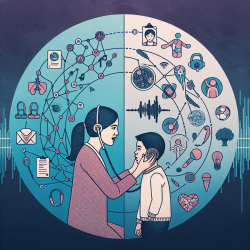The COVID-19 pandemic has brought unprecedented challenges, especially for children and youth with Autism Spectrum Disorder (ASD). The research article "Impact of containment and mitigation measures on children and youth with ASD during the COVID-19 pandemic: Report from the ELENA cohort" offers critical insights that can help practitioners enhance their support for these individuals. Here are some key findings and practical steps to implement these outcomes effectively.
Key Findings from the ELENA Cohort Study
The study highlights several areas where containment and mitigation measures have significantly impacted children and youth with ASD:
- Challenging Behaviors: There was a notable increase in challenging behaviors during confinement.
- Communication Skills: Some children showed improvement in communication skills, possibly due to reduced stressors and increased family interaction.
- Sleep Patterns: Changes in sleep patterns were observed, with some children experiencing worsening sleep issues.
Practical Steps for Practitioners
To improve support for children with ASD during such challenging times, practitioners can implement the following strategies:
1. Maintain Continuity of Interventions
The study found that children who continued to receive interventions, even via telehealth, showed better outcomes in communication skills. Practitioners should strive to maintain continuity of care through:
- Regular telehealth sessions
- Phone consultations with parents
- Providing resources and guidance for at-home activities
2. Focus on Communication Development
Given the observed improvements in communication skills, practitioners should emphasize communication development by:
- Encouraging family-based communication exercises
- Using visual aids and communication boards
- Incorporating technology to facilitate interactive sessions
3. Address Challenging Behaviors
To mitigate the increase in challenging behaviors, practitioners can:
- Develop individualized behavior support plans
- Train parents in behavior management techniques
- Ensure consistent routines and structure
4. Monitor and Improve Sleep Patterns
Given the changes in sleep patterns, it is crucial to monitor and address sleep issues by:
- Establishing a consistent bedtime routine
- Creating a calming sleep environment
- Providing guidance on sleep hygiene practices
Encouraging Further Research
The findings from the ELENA cohort study are invaluable, but they also highlight the need for further research. Practitioners are encouraged to stay informed about the latest research and consider participating in studies to contribute to the growing body of knowledge.
To read the original research paper, please follow this link: Impact of containment and mitigation measures on children and youth with ASD during the COVID-19 pandemic: Report from the ELENA cohort.










